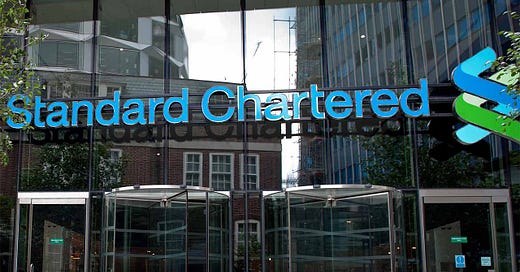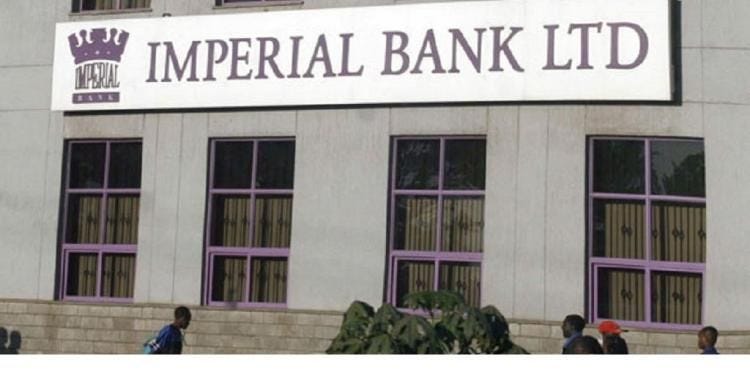Standard Chartered plans to Sell Assets in Africa and the Middle East
British multinational lender Standard Chartered Plc announced that it plans to exit several markets in Africa and the Middle East to focus resources on more profitable regions.
As part of this move, the bank has valued the assets in these markets at $1.63 billion (Sh216.6 billion).
The markets that Standard Chartered is exiting include Angola, Cameroon, Zimbabwe, Gambia, Sierra Leone, Jordan, and Lebanon. According to the bank's 2022 annual report, the assets and liabilities of these units have been classified as "held for sale," indicating that they are available for immediate disposal.According to Standard Chartered, the decision to exit these markets is part of a wider effort to simplify the group's business, which spans Africa, the Middle East, Asia, Europe, and America. The move will also leave the bank's Kenyan and Nigerian subsidiaries as its most important units on the continent.
The Kenyan unit contributed 10% of the group's earnings from Africa and the Middle East last year.
Of the $1.63 billion in assets held by the units to be disposed of, the majority ($1.39 billion/Sh185 billion) are financial assets, such as loans to customers and other banks, cash and balances at central banks, and debt securities.
The transactions are expected to be completed in 2023, according to the bank's annual report.
The move by Standard Chartered is part of a broader trend of foreign banks pulling back from certain markets in Africa and the Middle East. This has been driven in part by lower commodity prices and political instability in some countries, which have made it harder for banks to operate profitably.
ECONOMY
The average commercial bank lending rate in Kenya breached the 13% mark
The average commercial bank lending rate in Kenya breached the 13% mark, reaching its highest level in 58 months. This has been caused by the Central Bank of Kenya's (CBK) benchmark rate hikes and rising yields on government paper.
According to data released by the CBK, lending rates increased from 12.77% in January to 13.06% in February. This is the first time the lending rates have reached such heights since July 2018.
The expensive credit will make loans and mortgages out of reach for many individuals and could hobble corporate investment in Kenya's soft economy.
The increase in lending rates will have a significant impact on the Kenyan economy, especially on individuals and small businesses that rely on loans and mortgages to survive.
MARKETS
Kenya to Brace for Possible Increase in Fuel Prices as Oil Prices Surge
Kenya could be facing an increase in fuel prices in the coming weeks after large exporters reduced their exploration. According to BBC, the price of Brent crude oil has surged above $84 (Sh11,222) a barrel after several of the world’s largest exporters announced surprise cuts in production, pushing up oil prices by almost 6%.
The recent announcement by Saudi Arabia, Iraq, and several Gulf states to cut output by over one million barrels of oil per day has resulted in the rise in Brent crude prices. Russia announced that it would continue to reduce its output by 500,000 barrels per day through the end of the year.
what’s Next for Kenya
The further depreciation of the Kenyan shilling this month will also exert more pressure on the exchange rate, making imports even more expensive for domestic consumers.
As the value of the Kenyan shilling has fallen from Sh125 to over Sh132 per US dollar as of Thursday, an increase in global costs will likely translate to increased landing costs that are eventually passed on to consumers.
Kenyans could soon see an increase in fuel prices, which would lead to a ripple effect on the cost of transportation, goods, and services. This would further strain the already struggling economy, which has been grappling with high inflation rates and reduced purchasing power.
BANKS
1. Co-operative Bank Cuts Interest Rates for Select Borrowers
Co-operative Bank announced a reduction in interest rates for personal loans and asset financing, for select salaried borrowers who have a good repayment history.
The bank has reduced the rate from 14 to 13% per year, effective April 1.
However, The lender has not specified the number of qualifying customers who will benefit from the reduced rates.
According to Co-op Bank, the cut is in response to improved loan repayment records and reduced default risk that the targeted check-off scheme loans have recorded over time.
The check-off scheme loans are credit facilities provided to individuals who are employed and use their salary as security for accessing loan facilities.The bank has singled out civil servants as among the beneficiaries of the interest rate cut. The move is expected to enhance the bank's relationship with the civil servants segment, who are considered a stable income group.
2. High Court temporarily stopped the CBK from liquidating Imperial Bank
The High Court in Mombasa issued a temporary injunction stopping the liquidation of Imperial Bank, which is currently under receivership until a case filed by Ashok Doshi is heard and determined.
Justice Mutai Gregory issued an order stopping CBK from proceeding with the liquidation process and halting the appointment of KDIC (Kenya Deposit Insurance Corporation) as the liquidator of Imperial Bank. The order also temporarily stops the payment of depositors until the matter is heard.
Note: The liquidator had published notices in the Nation and Standard Newspapers asking depositors to come forward and fill in forms to enable them to be paid. However, the court's order puts a stop to this process until the case filed by Doshi is heard and determined.
In a certificate of urgency, Doshi's lawyer Willis Oluga argued that:
the appointment of KDIC was illegal and irregular.
According to Mr. Doshi, the bank owes him Sh900 million.
The CBK had appointed a liquidator after the lapse of time and hence the court should permanently restrain CBK from proceeding with the liquidation process.
Background
Imperial Bank was placed under receivership in 2015 after it was found to have engaged in fraudulent activities.
The bank's depositors have been waiting for the resolution of the matter for several years.
The temporary injunction issued by the High Court means they will have to wait a little longer for their funds to be returned.
TREASURY
Members of Parliament experienced a delay in the payment of salaries
Members of Parliament joined the growing list of Kenyan civil servants who are experiencing salary delays. A statement released by National Assembly Minority leader Opiyo Wandayi revealed that MPs were yet to receive their salaries.
According to Mr. Wadayi, It is customary for MPs to receive their salaries by the end of the month between the 26th and 30th. However, this had not happened.
"For the first time in our history, even MPs have not been paid," the statement reads in part.
"For the first time since independence in 1963, the government of Kenya is unable to pay salaries to civil servants and members of parliament Nearly all civil servants don't know when or if they will ever be paid. The situation has been degenerating progressively since December last year," he said.
WHAT YOU MUST HAVE MISSED
Kenya’s plan to set up 25,000 free Wi-Fi hotspots
Kenya’s plan to set up 25,000 free Wi-Fi hotspots has received a boost after the World Bank Group agreed to offer Ksh52 billion ($390 million) for the project in an effort to cut internet costs by 60%.
The disbursement is expected to finance the first phase of the project known as the Kenya Digital Economy Acceleration Project, which seeks to expand access to high-speed internet, improve the quality of education and digitise government services. The 25,000 Wi-Fi hotspots will be set up across the country to provide internet services to innovators, youth and entrepreneurs.
More than 82% of senior citizens are working for basic needs amid financial struggles - According to KNBS
The Kenya National Bureau of Statistics (KNBS) quarterly jobs report showed that 776,159 of 869,338 people above the age of 60 were in active employment in December, representing 82.1 percent of the senior citizens in the country. The Survey stated that many of those working were doing so to meet basic needs.
KNBS survey revealed that another 6,881 persons above the age of 60 joined young graduates in actively looking for jobs.
Workers above 60 years, Kenya’s contractual retirement age, increased by 7.7% between March and December of 2022.
Kenya is establishing a body organ and tissue donation bank
Kenya is taking a significant step towards improving its healthcare system by establishing a body organ and tissue donation bank. The bank is set to be launched in September and will be based at the East Africa Kidney Institute (EAKI) on Ngong Road.
The donation bank will be open to both the living and the dead, with the aim of growing the pool of donors to meet the high demand for organs and tissues in the country. According to Peter Mungai, the director of the East African Kidney Institute, the pilot program will initially focus on kidney donations since the organ is in high demand.
Donors to the organ and tissue donation bank will give their organs to anonymous recipients on the national waiting list. The match between the donor and recipient will be based on medical compatibility, ensuring that the transplant is successful.








